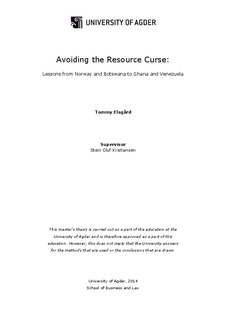| dc.contributor.author | Elsgård, Tommy | |
| dc.date.accessioned | 2014-09-16T10:51:15Z | |
| dc.date.available | 2014-09-16T10:51:15Z | |
| dc.date.issued | 2014 | |
| dc.identifier.uri | http://hdl.handle.net/11250/219870 | |
| dc.description | Masteroppgave i økonomi og administrasjon – Universitetet i Agder 2014 | nb_NO |
| dc.description.abstract | The purpose of this master thesis is find out what the resource-rich Ghana and Venezuela can learn from management of natural resources in Norway and Botswana. Previous studies show that institutions are an important determinant for the impact of the resource curse in resource dependent countries. By a comparative analysis, large differences in institutional quality are revealed. Transparency, accountability and a strong rule of law are found to be among the features that distinguish the successful countries. These differences translate into different economic policies. While Norway and Botswana have exhibited prudent fiscal management, government spending in Venezuela in particular, have been procyclical and unproductive. Although Ghana is lagging behind Norway and Botswana, the country should be able to avoid the resource curse if follows the path of the successes. Venezuela on the other hand, seems unlikely to pursue policies that can promote sustainable growth. | nb_NO |
| dc.language.iso | eng | nb_NO |
| dc.publisher | Universitet i Agder / University of Agder | nb_NO |
| dc.subject | BE 501 | nb_NO |
| dc.title | Avoiding the resource curse : lessons from Norway and Botswana to Ghana and Venezuela | nb_NO |
| dc.type | Master thesis | nb_NO |
| dc.subject.nsi | VDP::Social science: 200::Economics: 210 | nb_NO |
| dc.subject.nsi | VDP::Social science: 200::Political science and organizational theory: 240 | nb_NO |
| dc.source.pagenumber | 97 p. | nb_NO |
